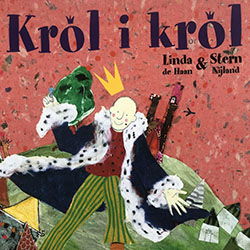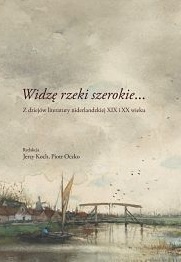Gender issues in the reception of Dutch literature
When you say 'the Pope' in Poland, you mean John Paul II, the largest religious community is the Catholic Church, and according to data from 2017 87% of the Polish population was baptized in the Roman Catholic rite. In 2012, approximately 93.0% of the population considered themselves to be Catholics. Although from 2010 on more and more Polish are undertaking apostasy, the Roman Catholic way of life is the most prevalent. In 2019 88% of children took part in catholic religion classes (in kindergartens, primary schools, and secondary schools), churches are full on Sundays and catholic holidays are celebrated by the majority of the population. It should therefore come as no surprise that the issue of sexuality and gender is considered taboo in many circles, and when it appears it is regarded as a threat to tradition.
King & King in Poland

Cover of the Polish translation of "Koning & Koning" by Linda de Haan & Stern Nijland: "Król i król", transl. Sławomir Paszkiet, AdPublik 2010.
There are several Polish writers who publish books about the LGBT-issues, both for children (Kim jest ślimak Sam? / Who is Sam the Snail? by Maria Pawłowska and Jakub Szamałek), for young adults (the books by Natalia Osińska), and for adult readers (Berek / Playing tag by Marcin Szczygielski). But the majority of books on this subject is translated. For the conservative part of the society this is a clear sign that this “gender ideology” (as any deviation from the heterosexual lifestyle is being called) is being imposed on Poles by the liberal and debauched West. This becomes particularly evident when gender topics are presented in children's literature.
The Dutch book Koning & Koning by Linda de Haan & Stern Nijland (2000) has been translated into polish by Sławomir Paszkiet and published as Król i król in 2010. This remarkably illustrated book tells the story of a young prince who needs to find his future wife and falls in love with another prince. The translator Sławomir Paszkiet (currently the director of the Maria Skłodowska-Curie Museum in Warsaw) is an active member in the campaign against homophobia, and the book was published by AdPublik, a small independent publishing house specializing in literature promoting diversity, tolerance and egalitarianism. It was founded by Robert Biedroń, a Polish politician and expert in human rights organizations and LGBT rights. He was also the first parliamentarian in Poland to call himself openly gay.
The first reactions to the Polish translation were rather positive. However, they did not have a greater resonance with the general public. 14 February 2010 The book was read in a small bookshop as part of a tolerance lesson in Warszawa. In the newspaper "Rzeczpospolita", the chairman of the Polish Federation of Associations for the Protection of Life, Paweł Wosicki, said that a small group of interested people (5 children, including the organiser's son) testified that common sense still prevails in Polish families. It was also said that immediately afterwards the children asked for a completely different book to be read. However, the book came to the attention of the Catholic media even before the Polish translation - the magazine "W drodze" informed with disgust in 2008 that the book (the English translation) had been introduced as compulsory reading for children aged eight in Massachusetts (USA). The entire article collects various children's books that present 'incorrect' values and places them against a collection of classic texts with 'universal values', such as The Little Match Girl or Bob the Builder.
After the publication, it was quiet for a while. In 2014 there was a real outcry. In the public library in Warszawa, a mother of two (Agnieszka) found the book and posted a comment on the library's Facebook site:
I hope that this book ended up in the library by chance and once. I think with concern that it would end up in the hands of my children.
She also offered to seal the book in a separate box with special commentary to "protect people from evil and degeneration". The mother was all the more indignant because a priest-poet named Jan Twardowski is the patron of the library, which in her opinion means that it guarantees safe content and proper development of children. In the discussion, several parents expressed their opinions. Very many were positive and stressed the benefits of such reading. But this news was immediately taken up by conservative (especially Catholic) media, who strongly criticised the book as well as its presence in public libraries. Some libraries have placed the book in a not so easily accessible place, so that it cannot be discovered by accident by a child. In March 2014, the rather liberal newspaper "Gazeta wyborcza" published a series of letters to the editor, all of which contained very positive expressions of parent. The comments of readers were mainly directed at the one-sidedness of these letters (none of them viewed the book with concern, like Agnieszka). The discussion did not last long and only occasionally was the title of "Król en król" used in conservative newspapers to show how "gay propaganda" works.
Marieke Lucas Rijneveld
On the 5th of may 2021 the Polish translation by Jerzy Koch of Marieke Lucas Rijneveld's radical debut novel The Discomfort of Evening has been released. Because of the special status (the International Booker Prize) it was a long-awaited premiere and many reviews followed. In many of them the non-binary status of the author played an important role. In 2010 the Dutch author added the name Lucas as a middle name, to represent their nonbinary identity. Because there’s still no non-binary pronoun in Dutch, Rijneveld choose to be referred to in Dutch as 'zij' (‘she’). The Polish language doesn't give the option of gender-neutral expression either, so many reviewers struggled with that, commenting on this problem usually in the first paragraph of their texts. It turned out that reviewers can be very imaginative. There were reviews written entirely in the present tense to avoid the past tense, in which verbs are conjugated according to type. The use of first and last names was also not straightforward - in Polish they too are conjugated. Thus, the name Marieke was conjugated as feminine, the name Lucas as masculine, and the surname was left in its root form Rijneveld, which meant that it was often perceived as feminine, although in some cases it could be masculine.

To emphasise the controversy, some headlines juxtapose words such as 'Christian' and 'transgender'
In February 2022 the author decided to make a change and asked for the use of masculine pronouns. Consequently, some Polish reviewers began to use only the name Lucas to emphasise their respect for the decision. In a Poland that is still quite Catholic and often conservative, where the ruling party uses LGBT+ people as the public enemy, the favour towards Rijneveld was unusual. This was also evident at the meeting during the Festival Mountaints of Literature in July 2022 (organized by Olga Tokarczuk Foundation) when the author signed books. Many people came to him, thanking for his honesty and for bringing the topic of non-binarity into the public discussion. He was thanked both by those fighting for non-discrimination, but also by non-binary people themselves and by the parents of young Poles who are still trying to find their identity in this unfavourable political structure.
LGBT+ in Literary History

"Widzę rzeki szerokie" - history of Dutch literature in Polish
The two volumes of Widzę rzeki szerokie…, edited by Jerzy Koch and Piotr Oczko, are an innovative attempt to present historical and literary processes in the Netherlands. The poly-perspective compendium has the form of academic essays, written by ten authors from diferent university centres. Volume two contains a chapter by Piotr Oczko Tęcza nad Skaldą i Amstelą. Niderlandzkie piśmiennictwo LGBT (Rainbow over the Scheldt and Amstel. Dutch LGBT writing) that discusses Dutch writing produced by, addressed to or merely addressing sexual minorities. It also includes a historical overview and cultural background of LGBT+ communities in Belgium and the Netherlands.
With regard to old literature (up to and including the 19th century), Oczko points out that it is often difficult to determine the authors' true intentions unequivocally. Here he cites the example of the 18th century authors of Sara Burgerhardt, Elisabeth Wolff and Agatha Deken, who are considered by some to be a homosexual couple (due to the fact that they lived together and wrote emotional letters to each other), although most scholars do not confirm such a hypothesis. It is remarkable that it is in the Polish history of Dutch literature that a chapter on this subject is included.
Read also about the controversy around the symbol of the Women's Strike and a rainbow flag at the balcony of the publishing house Dwie Siostry.
(Małgorzata Dowlaszewicz)
